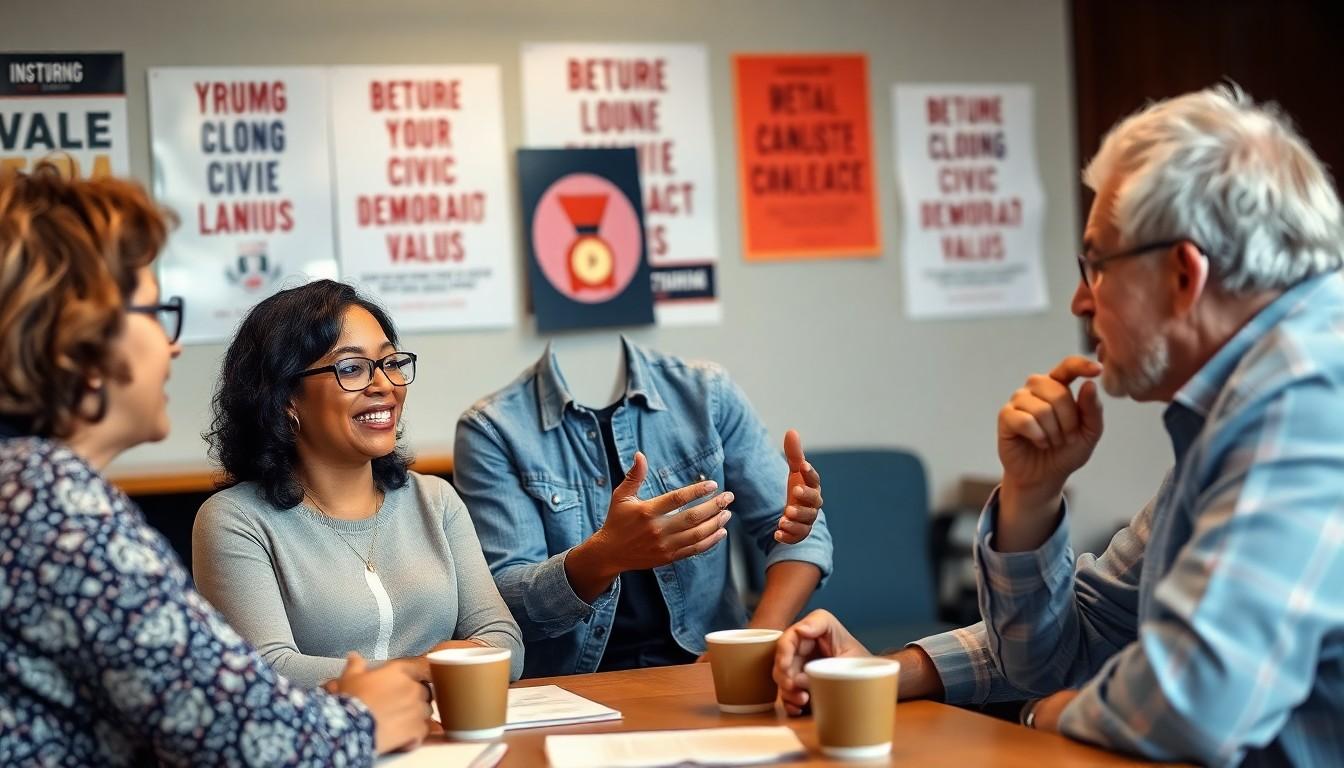The Best Fluffy Pancakes recipe you will fall in love with. Full of tips and tricks to help you make the best pancakes.

The Process by Which Political Values Are Formed Is Best Known As: A Deep Dive into Dynamics
In a world where opinions fly faster than a cat meme goes viral, understanding how political values are formed is crucial. It’s not just about shouting slogans or retweeting the latest hot take; it’s a complex dance involving personal experiences, social influences, and a sprinkle of good old-fashioned debate.
Overview of Political Value Formation
Political values shape individual beliefs and guide behavior in society. Personal experiences contribute significantly to this formation process. Events in a person’s life often influence their views on justice, equality, and governance. Social influences from family, peers, and cultural norms play a crucial role. Exposure to diverse perspectives can either reinforce or challenge existing beliefs.
Engagement in meaningful debate further refines political values. Conversations with others create opportunities to consider alternative viewpoints. Active participation in political discussions fosters critical thinking skills. Individuals refine their positions as they encounter new information and arguments.
Media consumption also affects political value formation. The constant flow of information presents various narratives and ideologies. It’s essential to critically evaluate these sources to avoid misinformation. Awareness of biases within media outlets can steer individuals toward more balanced perspectives.
Education systems introduce political concepts and theories. Academic environments encourage the exploration of democratic values and civic responsibilities. Coursework in social studies and political science helps individuals develop informed opinions. Knowledge gained through education can lead to greater political engagement.
Community involvement transforms political attitudes. Volunteering for local organizations or campaigns connects individuals to broader social issues. Civic participation not only instills a sense of responsibility but also cultivates a collective identity. This connection to community drives individuals to mobilize for change.
The formation of political values is influenced by a multitude of factors. Experiences, social dynamics, and educational avenues come together to shape individuals’ beliefs. Understanding this process is crucial in navigating today’s complex political landscape.
Key Theories of Political Socialization

Understanding political socialization involves recognizing the various influences that shape individual political values. This process encompasses numerous agents and stages that contribute to the formation of beliefs.
Agents of Socialization
Family serves as the primary agent, instilling foundational values from an early age. Schools play a significant role in introducing political concepts, promoting civic understanding, and encouraging democratic participation. Peer groups also influence political attitudes, especially during adolescence. Media consumption provides information and diverse viewpoints, shaping perceptions and opinions on political matters. Additionally, cultural norms and societal expectations can reinforce or challenge established beliefs. Each of these agents contributes uniquely to shaping individuals’ political perspectives.
Stages of Political Socialization
Childhood marks the initial stage, where basic values and norms are absorbed from family and surroundings. Transitioning to adolescence, individuals begin to form independent political views influenced by peers and education. Young adulthood often involves critical analysis of beliefs as individuals engage more deeply with societal issues. Finally, adulthood solidifies these values, often shaped by personal experiences, social environments, and continued civic engagement. Each stage plays a crucial role in developing a person’s understanding of and engagement with the political landscape.
Factors Influencing Political Values
Political values develop through various interconnected factors, shaping individual beliefs and attitudes toward governance and society. These factors include family, education, and media influence, each contributing to the political landscape.
Family Influence
Family serves as the primary agent of political socialization. Early exposure to political discussions at home significantly impacts children’s beliefs. Parents often instill foundational values, directly shaping their children’s views on authority, justice, and responsibility. Conversations during formative years establish a framework for understanding political concepts. When siblings partake in these discussions, it reinforces shared beliefs further. Continued engagement with family surrounding political topics encourages critical thinking and open dialogue.
Education and Political Values
Schools introduce essential political concepts that influence students’ understanding of civic duties. Through structured curricula, educators foster discussions on governance, democracy, and rights. Extracurricular activities, such as debate clubs or student government, provide practical experiences for students. These experiences instill knowledge and instigate critical analysis of societal issues. Engaging in civic education encourages active participation within communities. Teachers play pivotal roles in shaping students’ political values, offering diverse perspectives that challenge assumptions.
Media’s Role in Shaping Opinions
Media consumption significantly impacts the formation of political values. Various platforms expose individuals to a multitude of viewpoints, shaping perceptions about current events. Social media, in particular, creates echo chambers that can either reinforce beliefs or introduce conflicting viewpoints. Critical evaluation of media sources becomes essential to navigate misinformation. As individuals engage with diverse content, it cultivates informed opinions. Exposure to various opinions fosters essential critical thinking skills necessary for analyzing complex political issues.
The Impact of Culture on Political Values
Culture plays a significant role in shaping political values. Social customs, traditions, and collective history influence how individuals perceive authority and governance. Shared beliefs within a community can create a common understanding of justice and equality.
Art, literature, and music often reflect and challenge political ideologies. They serve as powerful tools for expression, enabling individuals to voice their values and dissent. Cultural movements frequently spark discussions about rights, freedoms, and responsibilities.
Language facilitates political discourse, impacting how ideas are conveyed. Linguistic nuances can define political engagement and influence perceptions of issues. Moreover, cultural narratives frame political debates, affecting how individuals align with specific political positions.
Religious beliefs contribute to the formation of political values. They often shape moral frameworks that guide civic responsibilities and expectations. In many societies, faith communities promote communal values that resonate with broader political movements.
Historical context also matters. Events such as revolutions, wars, and significant social movements leave lasting impressions on cultural identity. These experiences influence generations, shaping their political outlook and engagement.
The influence of culture extends to media consumption. Cultural representations in news and entertainment can normalize specific political perspectives. Critical analysis of these narratives helps individuals understand their values within a broader context.
Community involvement further enriches political value formation. Local traditions and collective efforts foster a sense of belonging and civic duty. Active participation in cultural events not only builds community ties but also reinforces shared political values.
Conclusion
Understanding the formation of political values is crucial in today’s dynamic environment. It involves a rich interplay of personal experiences social influences education and cultural contexts. By recognizing the significance of these factors individuals can navigate the complexities of political discourse more effectively.
Engaging in meaningful debate and critically evaluating media sources empowers people to refine their beliefs and challenge biases. As they explore diverse perspectives their political values can evolve leading to greater civic involvement and responsibility. Overall the process of political socialization shapes not just individual beliefs but also the collective identity that drives societal change.
